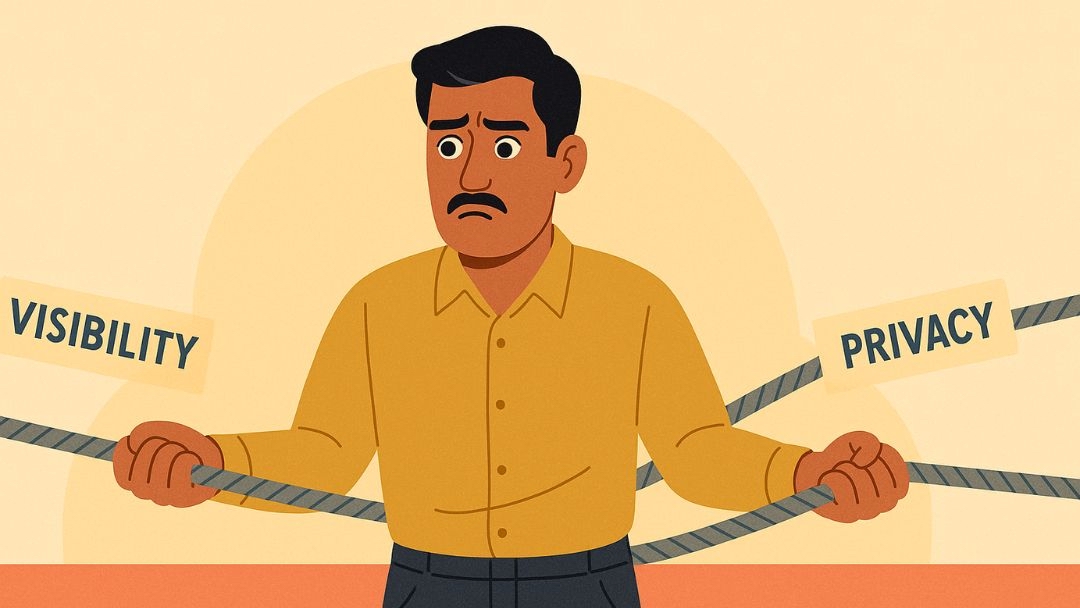Entrepreneurship with a Moderate Extraversion Score
Moderate Extraversion allows entrepreneurs to lead with presence without needing the spotlight. They know when to step forward and when to listen. This article breaks down how that middle-ground mindset supports long-term growth.


Back
7 mins read
Moderate Extraversion, which in some cases can be referred to as ambiversion, represents a middle ground between being highly outgoing and deeply reserved. Entrepreneurs with this trait tend to adjust their behavior based on the situation, knowing when to speak up and when to step back.
They can work effectively in diverse environments and find a common language with people who are on different sides of the extraversion spectrum.
In this article, we explore how moderate Extraversion shapes entrepreneurial style and what unique strengths come from standing between two extremes.
You may also want to read:
- How Does Low Extraversion Impact Entrepreneurial Style?
- How Does High Extraversion Affect Entrepreneurial Style?
- Best Jobs and Careers for an Extraverted Personality
- Big 5 Extraversion vs. Introversion: How Do These Traits Impact Learning Styles?
- Extraversion vs. Introversion and Leadership Style: Strengths and Communication Styles
- Big 5 Extraversion vs. Introversion Relationship Styles
How Does Moderate Extraversion Score Impact Entrepreneurial Style?

Moderately extraverted individuals have a harmonious blend of outgoing social energy and introspective insight. This balanced approach enables you to navigate business challenges quite effectively. You can effectively interact with others and enjoy tasks requiring you to work independently.
While those having high extraversion may have better socialization skills, their social interaction often consumes too much energy. It leaves them with no time to think and elaborate on ideas. Interestingly, highly introverted individuals tend to be less creative than people with moderate scores.
Unlike the extremes on both sides of the spectrum, moderate extraversion is associated with high creativity, meaning you can easily generate innovative business ideas and optimize existing business processes.
Tips for Achieving Success as an Entrepreneur with Moderate Extraversion

Moderate extraversion enables you to relate positively with others while taking time out for deep-dive thinking and creativity. It provides a special combination of attributes that can benefit an entrepreneur.
Drawing from introverted and extraverted qualities allows for creativity, problem-solving skills, self-awareness, and collaboration — all traits essential in any business setting.
Here are some advantages you can use to start and grow your business.
Negotiation and Persuasion
Your power of expression is invaluable when negotiating and presenting your ideas to investors or clients. Thanks to your balanced extraversion, you know exactly when the time is right for speaking up and taking in other people's feedback with open ears.
Reflective Decision Making
Unlike highly extraverted people, your moderate score indicates that you can take a moment away from an intense work environment to reflect. This capacity for introspection can help you make informed and effective decisions and avoid risky ones.
Leadership
A moderate level of extraversion can be an asset in leadership roles. Inspiring and motivating your team creates an atmosphere that encourages collaboration and respect. However, entrepreneurs with moderate extraversion also know when to step back and allow others to shine.
Customer Interactions
Moderately extraverted entrepreneurs are well-equipped to manage customer interactions effectively. You can easily converse with customers to grasp their requirements and build strong relationships. Moreover, your capacity for dealing with feedback and criticism will enable you to handle and use such situations for business growth.
Resilience During Setbacks
While it is common for those with extraverted tendencies to turn toward social support and voice their issues aloud, people with moderate extraversion can reflect on their own yet will seek external help when necessary. This balance can be integral in overcoming difficulties.
Cons of Having Moderate Extraversion as an Entrepreneur

Moderately extraverted entrepreneurs must be aware of themselves and use both sides of the extraversion/introversion spectrum to maximize their business efficiency.
There are many benefits of having a moderate degree of extraversion. Yet, there may be some difficulties that you could face in your entrepreneurial venture. Here are just some of them:
Ambiguity in Role Preference
Moderately extraverted entrepreneurs may find themselves in an ambiguous position as they try to juggle the roles that require assertiveness and sociability with those needing more introspection. This could leave you feeling confused when deciding your role within the organization.
Don't overwhelm yourself with too many tasks, even if you can perform them equally well. Remember, being an entrepreneur requires you to use resources effectively, including human ones.
Struggle with Extreme Personalities
Communicating with extreme introverts and extraverts can be a tricky task for those who are moderately extraverted. It may prove challenging to understand their perspectives or connect with them emotionally.
Try to understand each individual's needs and ensure that your communication style is flexible. Don't put excessive social pressure on introverts; communicate more with extroverts.
Misalignment with Traditional Business Roles
In traditional business environments, certain extreme traits, like the outgoing salesperson or the deep-thinking analyst, are often highly valued.
So you may struggle with these roles as you don’t fit them perfectly. Investing in yourself and honing your skillset is vital to broadening your horizons. Through continuous learning, you can expand the range of roles you can take on while boosting adaptability and versatility.
Resource Allocation
Given your knack for both extraverted and reflective tasks, delegating may be difficult. You may think no one can do the job as well as you. If not properly managed, this need for control could result in inefficient use of resources. So, entrepreneurs with moderate extraversion should carefully analyze various job roles and tasks within the organization and delegate them to those who can do them better.
Potential Identity Crisis
The push-and-pull between being socially engaged and craving moments of solitude can create inner turmoil, leaving one feeling confused about their identity. Entrepreneurs with moderate extraversion may require a deeper exploration of themselves through thoughtful reflection and introspection.
Famous Entrepreneurs with Moderate Extraversion

Often, people with moderate extraversion start as specialists in a specific field. Still, once they develop and grow professionally, they move to managerial positions or become entrepreneurs. Their creative thinking allows them to strive in creative and innovative industries, allowing them to drive technological progress and turn the most unbelievable ideas into reality.
Moderately extraverted entrepreneurs thrive in various industries and often have several successful businesses. Here are just some of them:
Elon Musk
Elon Musk, CEO of SpaceX and Tesla, appears to embody ambivert traits. He is renowned for his bold public pronouncements. Still, he reportedly devotes much time to reflecting on complex issues — a characteristic commonly associated with introversion.
Warren Buffet
The legendary "Oracle of Omaha" is renowned for his sharp business skills. Not only does he take pleasure in reading, a typically introverted activity, but he also enjoys interacting with others through large meetings and interviews as well as speaking publicly, hinting at a balance between extraversion and introversion.
Jack Ma
Jack Ma, co-founder of Alibaba, is a perfect example of the balance between introversion and extraversion. He's an immensely charismatic leader who serves as the face of his company, but also recognizes that moments alone are essential for self-reflection.
Tim Cook
Tim Cook, Apple's CEO, demonstrates a delicate balance of introverted and extroverted characteristics. Despite helming one of the world's most successful companies, he prefers to remain low-key yet scrupulous in his attention to detail. However, on the other hand, Tim is an impressive communicator and easily leads a huge global organization.
Reid Hoffman
Reid Hoffman, co-founder of LinkedIn, is a perfect example of someone who successfully balances introversion and extraversion. His contemplative nature allows him to think deeply about his strategies for the future. However, he's also aware that building strong professional connections is essential to succeed.
Mary Barra
As the CEO of General Motors, Mary Barra exemplifies a rare combination of introversion and extraversion. Her meticulous decision-making abilities and her strategic thinking are well-renowned, yet she also excels in communicating and leading a multinational corporation.
Larry Page
Larry Page, the co-founder of Google, is an excellent example of balanced extraversion and introversion. His low public profile reflects his introverted side. However, he has demonstrated an ability to easily manage and inspire big teams, demonstrating that extraversion is also in his repertoire.
Bob Iger
Bob Iger, the former CEO of The Walt Disney Company, is a prime example of someone who displays the balanced qualities of an ambivert. He effortlessly engages with people as an effective communicator and public figure, yet also knows when to take a step back for some much-needed reflection to make strategic decisions thoughtfully.
Moderate Extraversion Businesses and Industries

If you have a healthy balance of extraversion, your skills lend themselves to both group-oriented and individual endeavors. This ambiverted style makes you an ideal candidate for numerous entrepreneurial pursuits.
Bear in mind that success in business doesn't depend only on extraversion but also on other personality traits and your knowledge, experience, and other factors.
Your moderate extraversion could be particularly advantageous in the following industries:
Tech Startups
Tech startups often require their leaders to juggle multiple responsibilities, oscillating between positions that entail collaboration and interaction with others and those requiring concentrated individual efforts like coding or product design. Having a reasonable degree of extraversion can be highly advantageous in this context.
Content Creation
Creating content, whether it be through blogging, vlogging, or podcasting, involves a careful balance between solo endeavors such as research and creation of the material and social tasks like marketing your work, building connections with other creators in this space, and responding to viewers or listeners.
Event Planning
Event planning necessitates using social skills when interacting with clients, vendors, and attendees. However, it also requires dedicated concentration to organize and implement all elements for a successful event.
Research and Development Businesses
If you have a knack for tech or science, starting an R&D company might be the perfect career path for you. This type of job entails working closely with colleagues and communicating with clients.
However, it also demands being able to work autonomously on research projects, as “a major part of creative achievements involve individual, often solitary effort and endeavors."
Financial Planning Services
Financial planners must be extroverted to collaborate with clients and effectively identify their financial objectives. They must also be comfortable dedicating time to creating and assessing finance strategies independently.
Business Consultancy
Although consulting necessitates interpersonal communication, the ability to comprehend issues and form comprehensive plans largely depends on introspection and analysis.
Import/Export Business
Networking with suppliers, clients, and freight companies while managing logistical and regulatory details requires a careful balance. Someone who is moderately extraverted could excel in this type of business.
Entrepreneurship doesn’t always require extremes. If you fall in the middle of the Extraversion scale or if you are an ambivert, you may find that your strength lies in adapting, not conforming. The key is to trust that your balanced approach is not just valid — it’s valuable.


Return to Blog






